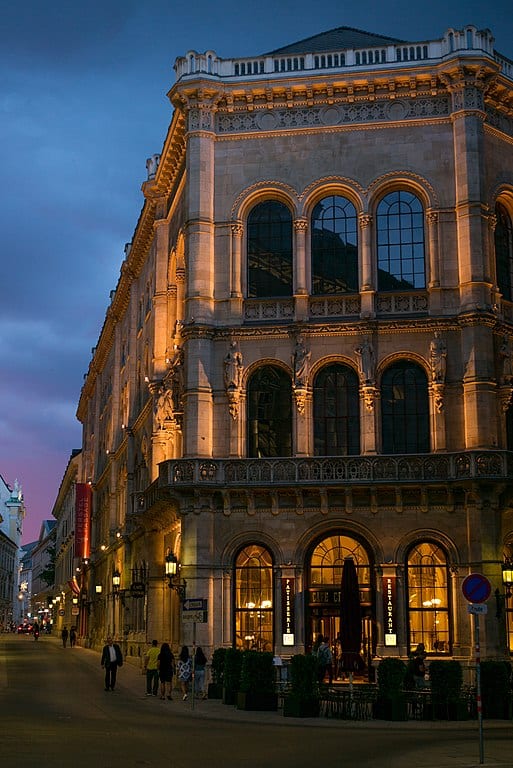



An Austrian coffee house is not just a place to sip a brew. It is a palimpsest of European social history, where revolution was plotted, lovers made hurried promises and epiphanies were sparked. It conjures romance and elegance, intellectual fervour and political intrigue. In 2011, Viennese coffee houses and their associated culture were put on UNESCO’s list of intangible cultural heritage.
This Christmas in Vienna, however, it proved harder to get access to one of these venerable institutions, than to a Taylor Swift concert. And so, we chose to walk the fairy light-punctuated streets instead, and delay coffee shop gratification until a few days later, when we were out of the capital city, in a non-touristy part of the Alps, called Bad Aussee. This was a charming town with ne’er a naughty Australian in sight, but with Viennese-style coffee houses aplenty.
 Café Central, Vienna. (Photo by Roman Boed via Wikimedia Commons 2.0)
Café Central, Vienna. (Photo by Roman Boed via Wikimedia Commons 2.0)
But I get ahead of myself. Before coffee, some history. We must travel back to 1683 when the city of Vienna was being laid siege to by the forces of Ottoman emperor, Mehmed IV. Prior to this historic cross and crescent face-off, Austria had been a coffee-virgin. But following the defeat of the 300,000-strong Turkish army by the combined forces of the Duke of Lorraine, the King of Poland, and Count Rudiger von Starhemberg, commander of the forces of Vienna, - a new caffeinated epoch dawned.
The fleeing troops left behind 25,000 tents, 10,000 oxen, 5,000 camels, 100,000 bushels of grain and a great quantity of gold. But also, sacks and sacks filled with unroasted, green coffee beans. Georg Franz Kolschitzky (1640 - 1694) a Polish soldier, was to become the first person in Vienna to obtain a licence to serve coffee in the city - apparently in recompense for “heroic actions” during the Siege. While the veracity of this story is debatable, it is part of Austrian folklore, as is the more politically charged anecdote of the origins of the croissant – that buttery, popular coffee-accompaniment.
I learned that what I had thought of as a quintessentially French confection, had an ancestor in a 13th century viennoiserie pastry called the kipferl. According to legend – we are now back in 1683 - Viennese bakers heard invading Turks tunneling beneath the city and were able to alert the guards in time to save the day. To celebrate this victory, the bakers reshaped the kipferl into something that clearly resembled a crescent moon – the symbol of Islam. Eating it was basically Christians symbolically devouring Muslims. This kind of took my appetite away. Luckily, for croissant-fans, the story is likely apocryphal.
Back in the present moment, my first proper coffee-house experience finally materialized in Bad Aussee. The rest of the family had gone off skiing, while I made my way to the Café Lewandofsky: the platonic ideal of the coffee house.
Round marble tables, bentwood chairs, a newspaper section, chandeliers, velvet drapes on the windows, pulled back to reveal snow-bound shops selling lederhosen. It was all just on the right side of twee. And then I ordered a café mit milch und ein croissant. I savored imaginary applause at my made-up-on-the-spot Deutsche while waiting for my order. And when it came, I was moved. The coffee was presented in a silver tray, with the milk in a tiny jug and a tiny square of chocolate besides. But what I loved most, was the unsolicited, tall glass of water. It seemed to offer an insight into human need and balance.
From the window, I watched a group of older women in neon water-proof jackets marching in unison with walking poles. A Chinese couple at the table next to me ordered a smorgasbord of pastries and giggled in pleasure over every bite. A few of the clients had terribly well-behaved dogs accompanying them.
The occasion seemed to demand a newspaper, but all those available were in German. So, I read my novel instead, a collection of short stories by science fiction guru, Ted Chiang. It was all about metahumans and gestalts. I gave up soon enough and returned to just sipping my coffee and looking out of the window. Everything else could wait.
Discover the latest Business News, Sensex, and Nifty updates. Obtain Personal Finance insights, tax queries, and expert opinions on Moneycontrol or download the Moneycontrol App to stay updated!
Find the best of Al News in one place, specially curated for you every weekend.
Stay on top of the latest tech trends and biggest startup news.